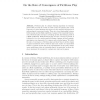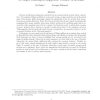140
click to vote
SAGT
2010
Springer
15 years 10 hour ago
2010
Springer
We analyze the performance of single-parameter mechanisms for markets in which there is competition amongst both consumers and suppliers (namely, two-sided markets). Specifically, ...
142
click to vote
SAGT
2010
Springer
15 years 16 days ago
2010
Springer
Abstract. Bounding the price of stability of undirected network design games with fair cost allocation is a challenging open problem in the Algorithmic Game Theory research agenda....
118
click to vote
SAGT
2010
Springer
15 years 16 days ago
2010
Springer
The solution to a Nash or a nonsymmetric bargaining game is obtained by maximizing a concave function over a convex set, i.e., it is the solution to a convex program. We show that...
124
click to vote
SAGT
2010
Springer
15 years 16 days ago
2010
Springer
Fictitious play is a simple learning algorithm for strategic games that proceeds in rounds. In each round, the players play a best response to a mixed strategy that is given by the...
130
click to vote
SAGT
2010
Springer
15 years 16 days ago
2010
Springer
We consider the computational complexity of coalitional solution concepts in scenarios related to load balancing such as anonymous and congestion games. In congestion games, Paret...
120
click to vote
SAGT
2010
Springer
15 years 16 days ago
2010
Springer
Abstract. We consider the existence of Partition Equilibrium in Resource Selection Games. Super-strong equilibrium, where no subset of players has an incentive to change their stra...
136
click to vote
SAGT
2010
Springer
15 years 16 days ago
2010
Springer
The class of weakly acyclic games, which includes potential games and dominance-solvable games, captures many practical application domains. Informally, a weakly acyclic game is on...
137
click to vote
SAGT
2010
Springer
15 years 16 days ago
2010
Springer
Abstract. One reason for wanting to compute an (approximate) Nash equilibrium of a game is to predict how players will play. However, if the game has multiple equilibria that are f...
121
click to vote
SAGT
2010
Springer
15 years 16 days ago
2010
Springer
Abstract. We consider network congestion games in which a finite number of non-cooperative users select paths. The aim is to mitigate the inefficiency caused by the selfish users...



